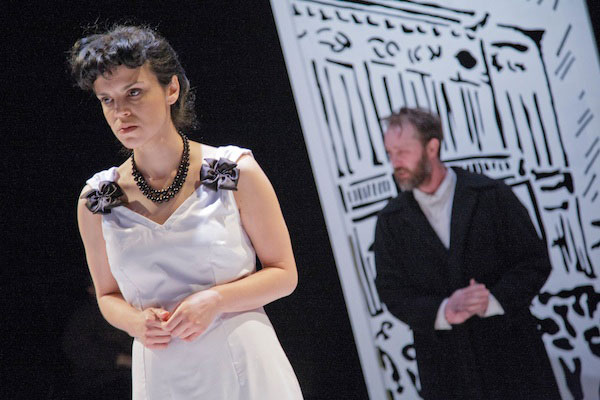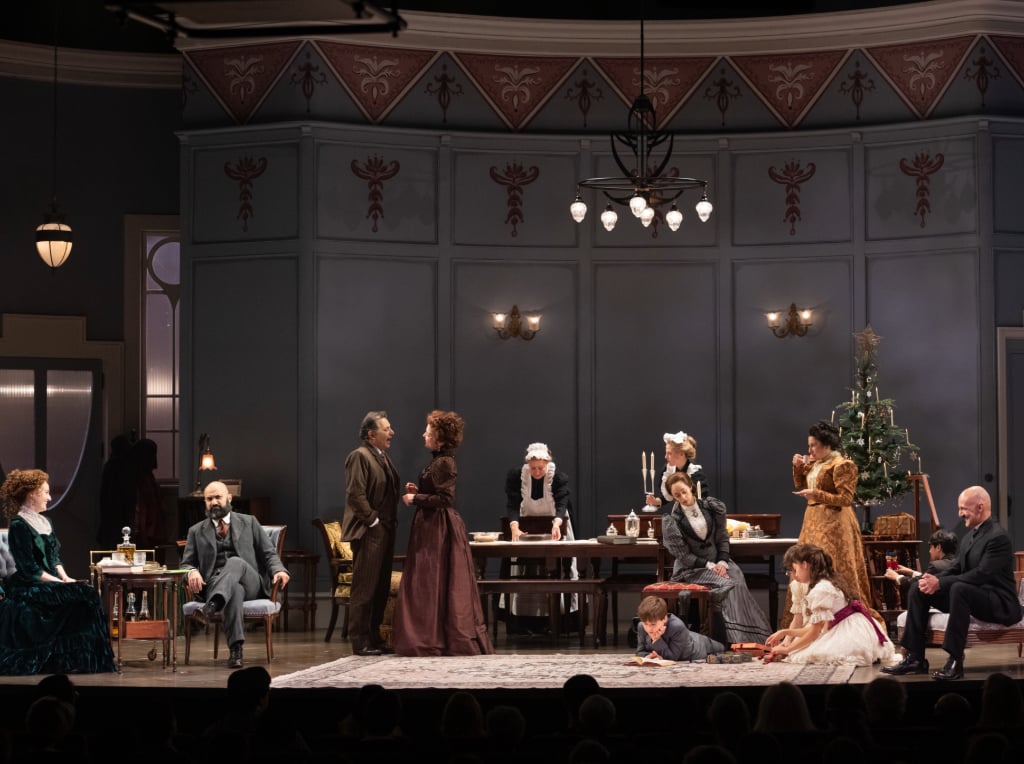Nora Achrati and John Stange in WSC Avant Bard’s production of Les Justes. Photograph by C. Stanley Photography.
![]()
WSC Avant Bard’s Les Justes takes an unflinching look at the kind of people who value their principles above all else, for whom the ends justify the means. They’re stirred by noble causes and willing to sacrifice all personal satisfaction to achieve a shot at a better world. They’re the heroes, really, of Les Justes.
Except our heroes in Les Justes are terrorists.
It’s a bait and switch from Algerian philosopher Albert Camus, who wrote the work in 1949; director Jay Hardee is working with a new translation and adaptation from local performer Rahaleh Nassri. The subject matter of the work is intriguing and timely, but its approach is very didactic. Les Justes gets at its characters’ motivations—and their second-guessing—through explicitly spelled out speeches and moments of grandstanding. It’s incisive, but also cold and melodramatic.
The play focuses on the assassination of Grand Duke Sergei Alexandrovich of Russia, and many of the characters featured in the play are based on the actual revolutionaries who plotted his downfall. The cynical Stepan (John Stange) has recently gotten out of prison and meets up with a band of fellow plotters, some previously known to him (like the leader Annenkov, played by Frank Britton), and others new to the cause, like the fiery young Yanek (James T. Majewski). Two assassination attempts are staged, the second successful, and Yanek, the primary bomb thrower, is imprisoned for his crimes.
Leading up to the assassination climax, Les Justes’ players ingest the play with a proud nobility, even as the characters experience flashes of doubt. Stange finely captures the kind of disdainful self-righteousness the old-school Stepan feels for the passionate, naive Yanek. The undercurrent of unfulfilled love between Yanek and his fellow freedom fighter Dora (Nora Achrati) is the play’s attempt to further drive home the sacrifices required of its devotees. The actors emote their characters’ pain convincingly, but it’s hard to be drawn into their plight when the play lays it all out so painstakingly.
The speechifying gets interrupted once Yanek is sent to prison. There, he interacts with an unbalanced fellow prisoner (Brian Crane), an amused prison guard (Josh Speerstra), and, finally, a calculating secret policeman (Graham Pilato). The scene provides a welcome flash of comic relief, though the direction here throws things a little off balance—whether it’s sudden, high-pitched pronouncements from Pilato or Speerstra’s unexplained habit of munching on an onion as if it were an apple, Les Justes suddenly feels like a quirkiness competition.
All of this leads up to Les Justes’ most affecting scene, in which the duke’s wife (Karen Novack), who was spared from the attack, comes to confront Yanek about his crimes. The duchess, played with strength and complexity by Novack, is a layered character who wants Yanek to repent. Though her love for her husband seems genuine, she isn’t entirely unsympathetic to his assassin’s motivations. Her appearance unsettles Yanek, and the audience waits to see whether it will ultimately sway him in another direction. It’s a scene with nuance and tension, qualities that often are lacking in this morality play.
Les Justes runs through March 11 at Artisphere in Rosslyn. Tickets ($25 to $35) are available through WSC Avant Bard’s website.
















